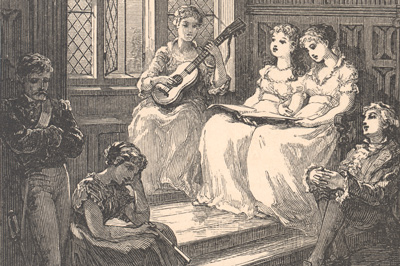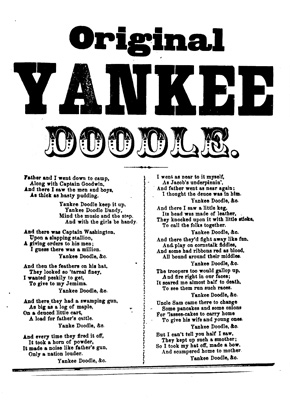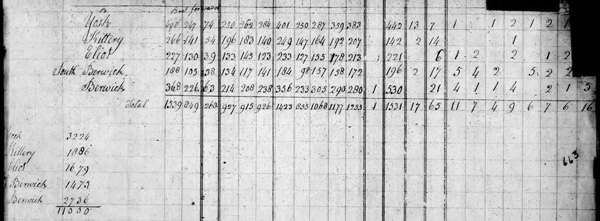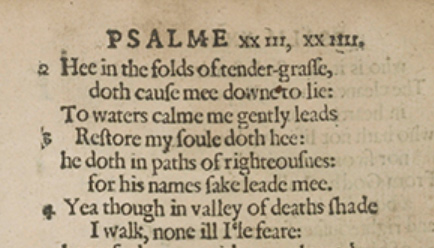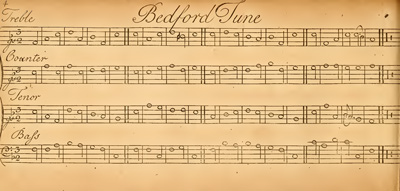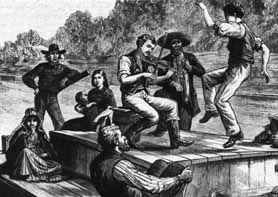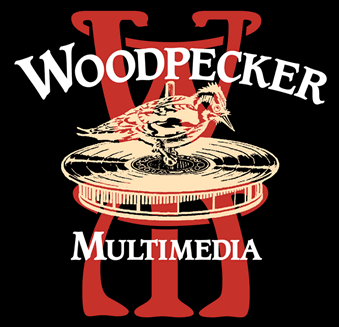 H
H 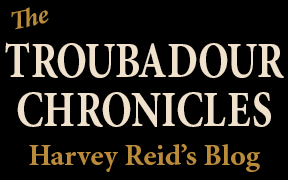
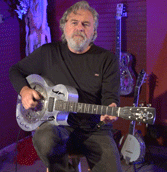

|
|
Music in Colonial New England LifeWhat were those famous Founding Fathers and their colonial neighbors doing musically way back when?
I grew up in Maryland, south of the Mason-Dixon line, and in my youth was surrounded by what I look back on as a lot of good music of many styles that were either widely or locally popular. I have always been puzzled at how high a percentage of the attention of musicians, critics and listeners has been paid to the Southern and not the Northern origins of our awesome American music. It was Appalachia this and Mississippi Delta that, and I heard about New Orleans, Asheville, the Piedmont and Atlanta, but little about Northern places other than New York. I first came to Northern New England 40 years ago with my bluegrass band, and have lived here almost all of that time. Other than some excitement in rural New Hampshire surrounding contra and Morris dancing, and some regional interest among fiddle people regarding Cape Breton and French Canadian traditional fiddling, the fabled American folk music tree never felt like it had nearly as many roots sucking nutrients from Yankee soil. So what were they playing and singing in colonial America during all that time? People were here for over 150 years before the Revolution, and it was another 90 years until the Civil War stirred things up considerably. I've heard very little about old Northern music, and sometimes wondered if they had any. The European colonists were sadly not interested in acquiring any religious or cultural ideas from the Native Americans, so we can presume that whatever music the colonists had here in the old days was what they brought with them or what they created once they were here. It's hard to know about music that happened before recording technology, and especially hard when it involves oral traditions, so keep that in mind as we try to determine what is known. Much of this subject involves sounds that could not be recorded, and the best evidence we have from the past is either what exists in writing, or what oral and audio histories can tell us. Melodies and lyrics from the distant past and from far away places sometimes embed themselves into the musical history of a culture in much the same way that regional pronunciations are passed along in languages. Yankee Doodle
For somewhere to start, I investigated the tune "Yankee Doodle." In my school days I was taught that it was something the colonists sang and liked at the time of the Revolutionary War. At the surrender at Yorktown it is said that the Marquis de Lafayette ordered his band to play "Yankee Doodle" to celebrate the American victory. It says in one history web site that the words were written mockingly during the French & Indian Wars by British army physician Richard Schuckberg, and were widely spread around in about 1770 on a broadside sheet. Most discussions of the song don't talk about the melody, but I did learn that the word "Yankee" probably came from the Dutch word "Janke," and a "doodle" was a slang word used back then for a fool or simpleton. The Library of Congress says that satirical and mocking songs were common in those days. Good old Wikipedia says "The tune of Yankee Doodle is thought to be much older than the lyrics, being well-known across western Europe, including England, France, Holland, Hungary, and Spain." So colonists knew some old folk melodies and nursery rhymes, which seems like a pretty reasonable conjecture. The tune might well have come to New England via the Dutch settlers in the New York region. Lack of African Influence David Wondrich ’s delightful book “Stomp & Swerve” makes the case that the collision and mixing together of African and European music was the source of the cultural explosion that brought us the amazing American music that rocked the world, including blues, jazz, rock & roll, country, soul, gospel, bluegrass and many other hybrid forms. This collision didn't take place on a large scale until the late 19th and early 20th century, though some historians believe it had a "big bang" event in the 1840s in New York City when the Virginia Minstrels band may have first combined fiddles and banjos, and begun making popular entertainment that drew equally from African and European traditions. North America was the place where the soup ingredients and cooking techniques were just right, not Europe, South America, South Africa or the Caribbean. And the American South was where it happened best. In New England there wasn’t enough African energy in the mixture, so the American musical soup never heated up in the North. In the 1820 census here in my town of York, Maine, there were 3224 people carefully counted. Exactly 9 of them were listed as slaves, and neighboring Kittery had 1. The whole of York County recorded 66 slaves, compared to a non-slave population of 11,197. They were listed in eight columns, two genders and four age categories.
They were all presumably freed later that year when the Missouri Compromise made Maine a new free state, breaking it away from Massachusetts, though who knows how many (or few) of those folks stayed in Maine to participate in our local folk music. With those ratios, I doubt there was much African energy in local music parties or in the church hymn singing, though certain songs could have entered certain families via a slave's musical influence. Church Music When I discovered George Hood’s 1846 book “A History of Music In New England” it hit me like a brick as he described in painstaking detail what had been going on around here musically since the early 1600’s. (You can find a free download of the book online and read it yourself.) The first sentence in the book says most of what you need to know to get the picture of why all the action was down South: “The history of music in New England, for the first two centuries, is the history of Psalmody alone…” Two centuries is a long time, and Psalmody is a word we don't encounter these days. Psalmody is simply the singing of the Psalms of David. Hood continued: “…and this is so intimately connected with the history of the church, that he who would fully know the one, must understand the other.” Oboy. The Puritan church and caliphate. The Taliban. Those legendary people who hopped into the Mayflower in 1620 to escape religious oppression, and then started oppressing the Indians and anyone else who did not share their values and supposed love of freedom. They started whipping and hanging Quakers in the 1650’s, and the burning of witches peaked 40 years later in 1692, so hang onto your hats to find out what kind of awesome music they were into. Here in Maine, the first settlers were known as Royalists, and they were friends and subjects of the king, and Anglicans, not Puritans. Our little Royalist colony of Georgeana here was annexed by Massachusetts Puritans in the 1690’s also, so the possibility that there was more interesting or different music in a few towns in Maine for 50 years between 1640 and 1690 is something I’ll mention but not explore. Hood gets into the gory details, and as you might guess, the Yankee Puritans argued about nearly everything. They argued about whether people should be required to stand while singing, about whether heathens and “carnal men” should be allowed to sing also, about whether women should be allowed to sing in church, and about whether they should allow reading from books, or be required to memorize the songs. At that time women were not allowed to speak in church, so many men believed that they should not sing either. Hood says "Some believed that Christians should not sing at all, but praise God with the heart. Others believed it right to sing, but thought it wrong to sing the Psalms of David. Some believed it wrong for any but Christians to sing, and others thought that only one should sing, while the assembly should join in silence, and respond Amen." The Puritans and early colonists apparently did not believe in the playing of instruments or in reading music, but the prevailing Calvinist thought of that time was that it was healthy for people to sing praises to God regularly. The first edition of Metrical Psalms With Musical Notation for the Church of England, by Sternhold and Hopkins, London, 1562 says about singing psalms, that they are “to be sung in churches of the people together, before and after evening prayer, as also before and after sermon; and moreover in private houses, for their godly solace and comfort, laying apart all ungodly songs and ballads, which tend only to the nourishment of vice and corrupting of youth." This made me wonder where they got the starting pitches for their a capella singing. Almost all choirs and vocal groups use a pitch pipe or keyboard to get a song started in the right key. John Ogasapian, in his book "Music of the Colonial and Revolutionary Era" said that wooden pitch pipes were generally used in smaller churches. He also says that by the end of the 1700s a few pipe organs were showing up, and that sometimes cellos, flutes or bassoons might accompany a congregation's singing. Rev. Chauncey wrote in 1727 in a diatribe to lobby for the adoption of sight-reading of music that "The Puritans and their children, believed, like the Scotch, that singing- -was a solemn duty, obligatory upon all. They sang not by proxy, nor only in church, but in their families." One of the chief objections to written music was that it was "popish" and would lead to the Church of England, organs and those things they disliked. This is a bit of "gory detail," but in W. Chappell's 1859 book "Popular Music of Olden Times" he really lays it out how opposed the Puritans were to music, whether made by peasants or church people. "In 1586, while Parliament was sitting, another virulent Puritan pamphlet was printed and industriously circulated. It was entitled “A request of all true Christians to the Honourable House of Parliament.” It prays “that all cathedral churches may be put down, where the service of God is grievously abused by piping with organs, singing, ringing, and trowling of Psalms, from one side of the choir to another, with the squeaking of chanting choristers, disguised (as are all the rest) in white surplices; some in corner caps and filthy copes, imitating the fashion and manner of Antichrist the Pope, that Man of Sin and Child of Perdition, with his other Rabble of Miscreants and Shavelings.” In this book, deans and canons are described as “unprofitable drones, or rather caterpillars of the world,” who “consume yearly, some 2500£., some 3000£., some more, some less, wherein no profit come into the Church of God.” Cathedrals “are the dens of idle loitering lubbards; the harbours of time-serving hypocrites, whose prebends and livings belong, some to gentlemen, some to boys, and some to serving men and others." While such were the invectives of Puritans against church music, even in Queen Elizabeth’s reign, it could not be expected that secular music, or any but their own “psalms to hornpipes,” should escape similar aversion. Accordingly, Stephen Gosson, in his Schoole of Abuse (1579), comparing the music of his time with that of the ancients, says, “Homer with his musick cured the sick soldiers in the Grecian camp, and purged every man’s tent of the plague;” but “ thinke you that those miracles could be wrought with playing of dances, dumps, pavans, galliards, measures, fancies, or new strains? They never ‘came where this grew, nor knew what it meant. ...The Argives appointed by their laws great punishments for such as placed above seven strings upon any instrument: Pythagoras commanded that no musician should go beyond his diapason” [octave]. “Were the Argives and Pythagoras now alive, and saw how many strings, how many stops, how many keys, how many clefs, how many moods, flats, sharps, rules, spaces, notes, and rests; how many quirks and corners; what chopping and changing, what tossing and turning, what wresting and wringing, is among our musicians; I verily believe that they would cry out with the countryman, Alas.’ here is fat feeding and lean beasts; or, as one said at the shearing of hogs, Great cry and little wool, Much ado and small help.” A passage from this author “against unprofitable pipers and fiddlers,” and one from Thomas Lovell, against “dauncing and minstralsye,” have already been quoted under Queen Elizabeth’s reign (ante pp. 107, 108); …even Thomas Lodge, who replied to Gosson “in defence of poetry, musick, and stage plays,” would not defend the merry-making pipers and fiddlers. He says, “I admit not of those that deprave music: your pipers are as odious to me as yourself; neither allow I your harping merry beggars; Philip Stubbes, in his Anatomy of Abuses, first printed in 1583, (and so popular with the Puritans that four editions of it were printed within twelve years), devotes an entire chapter against music. He says that from “a certain kind of smooth sweetness in it, it is like unto honey, alluring the auditory to eifeminacy, pusillanimity, and loathsomeness of life....And right as good edges are not sharpened, but obtused, by being whetted upon soft stones, so good wits, by hearing of soft music, are rather dulled than sharpened, and made apt to all wantonness and sin.” He complains of music ‘being used in public assemblies and private conventicles as a directory to filthy dancing;” and that “through the sweet harmony and smooth melody thereof, it estrangeth the mind, stirreth up lust, womanisheth the mind, and ravisheth the heart.” Speaking of the minstrels who had licenses from the justices of the peace, and lived upon their art, he says, “I think all good minstrels, sober and chaste musicians (I mean such as range the country, riming and singing songs in taverns, ale-houses, inns, and other public assemblies), may dance the wild morris through a needle’s eye. There is no ship so balanced with massive matter as their heads are fraught with all kinds of lascivious songs, filthy ballads, and scurvy rhimes, serving for every purpose and every company.” Puritan times around here must have been a low point for being a musician around here in Northern New England. I swear I can still feel the faint remnants of their scorn for music and musicians. About Psalmody The Psalms comprise 150 of the 185 songs in the Bible, though they were just verse, with no particular meter and no melodies. They had been translated a number of times from their original language, which we assume to be old Hebrew, though the earliest surviving manuscripts are apparently in Greek and Syrian. What happened to them on their long journey from David and Solomon in antiquity to the colonial singers in America would probably fill an entire book. Something called the Geneva Bible was the first one brought over to the American colonies, and the King James Bible many of us have seen all our lives was created in 1611 for the Anglican Church. It may have been part of why the Puritans left England rather than what they chose to bring with them. How different the Psalms of David were in the different Bibles of that day is an interesting subject, and one I’ll leave it for you to investigate on your own. The goal here is just to try to paint a picture of what music was like in early colonial life. Colonists sang the Psalms to the melodies they knew, but what were those tunes? How did they sing them? Did they use pianos, guitars or organs? Apparently not. Musical instruments were shunned and possibly forbidden, at least in some northern colonies, and the first pipe organ didn’t show up in a church in the colonies until one was installed in a church in Newport, Rhode Island in 1733. This was reputedly the only pipe organ in the colonies to pre-date the 1776 Revolution. It would be another century until the type of church music we are now familiar with became widespread, as Psalmody gave way to Hymnody in the first half of the 1800s. The Puritans were opposed to the Anglican Church; so their churches were plain and unadorned, and they rejected a number of common musical practices of the English church. The Pilgrims brought a book of hymns called the “Ainsworth Psalter” with them, but they soon felt the need to make a new one. The first book published in the Colonies was the “Bay Psalm Book,” which was printed in Cambridge, Massachusetts in 1640. Its 26th edition was published in 1744. (It's also the most valuable book in the world, and one of the few extant copies of the book sold for over $14 million at auction recently, funding renovations at Boston's Old North Church.) It's kind of amazing that just 20 years after the Mayflower sailed, somebody hauled ink, paper and a printing press over here to the wilderness. Interestingly, the first Bible published in the colonies, in 1663 by a man named John Elliott, was in the Algonquin Indian language. The Bay Psalm Book dominated New England music books for quite a while, though there were an increasing number of competing books of Psalmody that were made locally or imported. George Hood walks you through a lot of them, and tries to detail the evolution and turmoil inside the world of early colonial Psalmody, but it's pretty dry stuff. It is worth a little look under the hood to try to wrap our modern brains around the un-modern situation of what they were doing musically back then. They knew what songs they wanted to sing, but they had to decide what tunes to sing them to, and vitally important, because the Psalms had no rhyme or meter, they had to be modified to make them singable. This led to the concept of “metrical Psalmody,” which occupied Psalmodists and church leaders for a staggering number of years. Adding meter to the Psalms Since the Psalms were blank verse, with no melody or rhythm, the colonists applied the existing rules of hymn meter, which was to identify and assign syllabic and metrical patterns. They assiduously tried to modify or cram the words to fit melodies they knew, and sorted the Psalms out according to which metrical pattern best applied to them. They adopted Long Metre, Short Metre, and Common Metre as frameworks to force the unmetrical Psalms to become singable. Even the serene George Hood commented on this practice, saying "let not the reader wonder at the Vandal-like style of the poetry in this..., sacred lyrics at that day, were, one might think, transposed to see how far they could be driven from their natural order." The 23rd Psalm is probably the most famous Psalm of all, and the opening line most of us know well is “The Lord is my shepherd, I shall not want.” In the Bay Psalm Book, this became: “The Lord to me a shepherd is, I swear I am not making this up. It’s doubly lame because I recognize the odd phrasing in the first line from a really nice poem titled “My Mind To Me A Kingdom Is” that Thomas Percy quoted in his 1765 “Reliques of Ancient Poetry,” saying that it was a popular poem in the 16th century England, possibly written by Sir Edward Dyer. It was quoted and therefore older than a 1588 book: “Psalmes, Sonnets, and Songs of sadness and pietie, made into Musicke of five parts: &c.” By William Byrd, one of the Gent. of the Queenes Majesties. The title was also quoted by Ben Jonson in his play "Every Man out of his Humour," first acted in 1599. You are no doubt dying to know what those enterprising Psalmodists did with the next lines of Psalm 23. In the Geneva Bible, which the Pilgrims had with them, the Psalm went like this: "The Lord is my shepherd, I shall not want. He maketh me to rest in green pasture, and leadeth me by the still waters. He restoreth my soul, and leadeth me in the paths of righteousness for his Name’s sake. Yea, though I should walk through the valley of the shadow of death, I will fear no evil... This became in the Improved Dunster & Lyon version of the Bay Psalm book (a little different than the picture here from the older edition): “He in the folds of tender grass doth make me down to lie He leads me to the waters still, restore my soul doth He In paths of righteousness, he will for his name’s sake lead me Yea though in valley of death's shade I walk, none ill I'll fear."
Makes you wonder if anybody thought it was odd to follow the word "ill" with the word "I'll," or if it was intended to be a joke. Maybe it was a lesson in punctuation and capitalization that somebody felt was good for the parishioners. It's numbing to think that for nearly 200 years, people around here did little musically except sing this sort of thing to a handful of melodies, with no musical instruments, and presumably a shortage of smiles on their pious colonial faces. Melodies used in the church So we know they did whatever they felt they needed to make the words fit a meter, but what melodies did they sing the Psalms to? Hood says they came from a 1618 book called the Ravenscroft Collection, that supplied the colonists with tunes for about 100 years. Playford's book came later, with more tunes, as did books by Tufts and the popular Walter's Singing Book. The tunes were each given names, and the old hymnals (and also modern ones) refer to names of the tunes, such as the Martyrs tune, the Bradford, the York, the Portsmouth, Oxford, Litchfield, Windsor, Bedford, St. David’s and the Hackney tunes, among others. They always appeared as 4-part vocal arrangements, and you can find computer generated sound files on some web sites, especially www.hymnary.org that let you hear what they sound like. The song we now know as Amazing Grace began life as a set of words written to the tune then known as New Britain.
This interchangeability of tunes and words has gone on for centuries, and even modern hymnals list the metrical pattern of each hymn, and there are charts of compatibility. The "BEDFORD" tune has a meter 8.6.8.6, and is thus interchangeable with BEATITUDO, BANGOR, DUNFERMLINE, SOUTHPORT and DUNDEE. The transition from the old Psalmody was not instant, and along the way the colonial Psalmodists found numerous ways to bicker about how best to praise the Lord while singing. If they were not going to read music, then how did they know or learn what to sing? The “old school” solution was called “lining out” the hymns, which meant that the leader would sing each line, and the congregation would repeat it. This of course doubled the length of every song, and there was a schism between churches that wanted to move on from this and those that didn’t. At least one minister quit in protest when his congregation voted to stop doing the lining-out. Hood says that “About the year 1690 there was for want of a proper supply of tunes, a general dullness and monotony in the music of the church.” Reading of music didn’t really start until the 1720’s, since they were afraid it would lead the the playing of instruments, and some church members even thought that the names of the notes were blasphemous. (The origins of the do-re-mi names for notes is absolutely fascinating, though I don't want to go there. They are the first 2 letters of each line of a Gregorian chant about John the Baptist, attributed to eighth-century Lombard historian Paulus Diaconus, and spread around Europe in Guido D’Arezzo’s Micrologus, written in 1026. Somehow Ut got transformed into DO in deference to Italian theorist Giovanni Battista Doni, though Ut is still used to name the C clef. Ut queant laxis The Psalmodists called singing by ear and from memory “Usual singing” and the new-fangled idea of reading notes was labeled “Regular Singing.” An influential essay in 1720 by Rev. Thomas Symmes of Bradford, Mass. called “The Reasonableness of Regular Singing” was widely disseminated, and helped to usher in and establish the modern practice of a congregation holding hymnals and reading the hymns along with an organist. The essays and books they published to try to convince people that the solution to church music problems was to introduce sight-reading were interesting. In "Walter’s Singing Book," it says that “… our Psalmody has suffered the like inconveniences which our Faith has labored under,… trusted to the uncertain and doubtful conveyance of Oral Tradition. Our tunes are, for the want of a standard to appeal to in all our singing, left to the mercy of every unskillful throat, to chop and alter, twist and change, according to their infinitely divers and no less odd humors and fancies… There are no two churches that sing alike.” They called it a Musical Reformation, and by mid-1700s, the practice we still see today of congregations standing and reading hymnals was established. As you might imagine, the Yankees loved uniformity. Rev. Nathanial Chauncey of Durham, CT wrote in 1725, in response to what was an initial uproar against the instituting of sight-reading: "When singing the Songs of the Lord, we ought to proceed by a certain Rule, not in any loose, defective, irregular way, that this or that people have accustomed themselves unto..." So About Folk Music... So what non-church music can we investigate? In my blog post about Bob Dylan’s Nobel prize, I dug into the so-called “Poor Laws” and the “Vagabond Act,” that essentially outlawed folk music and the troubadour arts in general in England in the late 1500s. Presumably also the impact was felt in early American colonial life, and one wonders if the colonists who fled religious persecution had lots of wild fiddle parties. A series of laws were passed in a number of European countries that essentially outlawed minstrelsy and public music that was not sanctioned by the church or the wealthy. One of the most famous laws, the Vagabond Act of 1572 said that any musician who was not working for “an honourable person of great degree” was "to be grievously whipped and burned through the gristle of the right ear with a hot iron of the compass of an inch about." The fear of gypsies and mistrust of traveling people, combined with an ethic that implied that anyone who was capable of work should be working and not playing music, led to the arrest, imprisonment and even execution of the remaining troubadours who had plied their trade for centuries in Western Europe. Puritan Oliver Cromwell took over England from 1653-1658, and outlawed sports, Christmas, Morris dancing and the stage. Theaters were closed, though paradoxically Cromwell was said to love music, and reportedly commissioned 48 violins to provide dance music for his daughter's wedding, and often 24 violinists for his meals. So the colonists who fled Europe to come to the colonies came from a world where street and tavern music had been outlawed for half a century, and since the church was at the center of colonial life in much of the American colonies, it makes sense to envision the towns in the New World having very little public music that was not done in the church. So what about this non-public, non-church music? They have had to dig pretty hard to find much evidence of peasant music in early New England. One source I found pointed out that almost all written mentions of non-church music were condemning or banning it, which tells us that it existed, but does little to say what it was. Mothers undoubtedly sang lullabies to their children, and knew some ballads, and they had a few fiddles, fifes, horns, hautboys (a type of oboe) and even reportedly occasional citterns, a type of English guitar, but the music was rarely public. Rev. Cotton Mather, a Massachusetts minister who was deeply involved in the Salem witch trials, was also a church music guy who was a staunch opponent of the use of musical instruments in church. He minced no words in his condemnation of the hurdy gurdy, which he called an “instrument of torture.” But this means that he must have heard them a lot in order to hate them so much, so that's a healthy sign. It's also possibly significant that Rev. John Cotton wrote a treatise in 1647 where he said that "Wee grant also, that any private Christian, who hath a gift to frame a Spirituall Song, may both frame it, and sing it privately, for his own private comfort, and remembrance of some speciall benefit or deliverance. Nor doe we forbid the private use of any Instrument of Musick therewithall; So that attention to the instrument, doe not divert the heart from attention to the matter of the Song." This seems to say that there was some sympathy among the powerful clergy for people who wanted to play musical instruments for their private pleasure. They were not banned everywhere, just in church and in public, not unlike the way our modern society treats pornography. Fiddling
In rural areas, and in homes or small churches, people made music with whatever instruments were available. The fiddle traveled better than many other instruments, and by itself it was enough to have a party or a dance. The fiddle is the loudest of the stringed instruments, and its ability to generate rhythm and spark dancing was undoubtedly what got it labeled the "instrument of the Devil." The reading I have done has indicated that most communities relied heavily on local fiddlers for dances, and that good ones were sought after, paid well and kept quite busy. Thomas Jefferson even played the fiddle. Historians have a number of tunebooks from the 1700s, so we know many of the tunes people were playing at that time, or at least those who were reading their fiddle music from the pages of a book. Settlers from different countries and cultures brought their diverse fiddle styles with them, and because travel was slow and difficult in early days there wasn't much interaction among regions or even between players in neighboring areas. So the fiddling (and presumably the songs people sang) in Virginia differed from what was going on in New York or Vermont. Richard Blaustein says that "The first fiddle contest known to be held in the American colonies was part of a St. Andrew's celebration in Hanover County, Virginia in 1736." These became a popular form of entertainment that endures to this day, and helped spread musical ideas around. Fiddlers would come from quite a distance to compete for money or high-quality instruments given as prizes. Not only did the musicians get to hear each other, but audiences were also exposed to a much wider variety of skilled players, tunes and styles than usual. I found an interesting article called "Why Black Folks Don't Fiddle" by African-American old-time musician Tony Thomas. He reiterates what I have read many places, which is that slaves took up the fiddle all over colonial America, and that this tradition continued until the 20th century. Thomas says that modern African-Americans today shun the fiddle because it is the instrument with the most continuity to the rural Southern past, and thus to slavery, though that is what I have always heard about why you rarely see an African-American play the banjo. Thomas says: "African American mass culture, at least in the 20th century, seems to share none of this desire to look backward and identify with 'the good old days.' Perhaps that is because for us, the old days were not very good." He then says, more tellingly, "There is simply no counterpart in Black mass musical culture to revivalist folk music, country music, and bluegrass music's attempts to identify with older musics and older life." Interestingly, when jazz was forming around 1900 around New Orleans, the African-Americans were playing stringed instruments, in particular the fiddle and banjo, more than the horns that you might associate with the origins of jazz. The horns took over around 1915, and the long association of African-Americans playing the fiddle ended quickly. The impact that African-American musicians have had on horn, guitar and piano playing is incalculable, though there isn't much in the way of early recordings that capture the remnants of those centuries of Black fiddle music. The earliest such recordings were made in the mid 1920s, which means that during the crucial 36 preceding years, beginning with the release of the first commercial cylinders in 1889, they failed to record any. Taverns & Inns Drinking was big in the colonies, except in the heavily religious areas. Even children drank beer. Taverns, inns and public houses always featured music along with the drinking, though all we can know about it was whatever someone might have written in a diary or a letter. Travelers stayed in these establishments, and local patrons, gamblers, prostitutes and musicians fell in together to amuse themselves, eat, drink, argue, sing and pass the time in the days before television and jukeboxes. Inns usually had some musical instruments for patrons to play, and in New York, Pennsylvania, and the more southern colonies, there was undoubtedly all sorts of music without a centralized source, with patrons, travelers and local musicians sharing the musical entertaining duties. (Sort of like it is today in taverns that hire musicians.) A number of sources I found said that a lot of music of that era involved new words written to tunes that people knew. Satire seems to have been very big in the 1700s, and though people didn't read music much and for the most part could only learn a song from another person, they could print lyrics in newspapers, pamphlets and on broadside sheets to spread them around. The Star Spangled Banner (1812) was such a song, written to be sung to the English drinking song “To Anacreon in Heaven.” It was originally called "The Defence of Fort McHenry," and was one of many sets of lyrics that Francis Scott Key wrote to a number of songs of the day. This is essentially what Woody Guthrie did, since Woody borrowed almost all the tunes to his songs and was constantly writing new lyrics to existing songs, like Francis Scott Key. The widespread sale of sheet music to Americans, which became the first music industry, didn't start happening until the 1800s. Prior to that tunes were learned by ear, and traditional ballads were passed on and sung, along with the newly-written broadsides, which usually offered new words to an existing tune that people knew. Traveling singing teachers had a big effect in rural areas, mostly in the days after reading music became more normal. They often published and sold their own books, and operated locally or regionally, so that certain songs and tunes were introduced and propagated in some areas that didn't spread further. Attempts to track the way ballads and folklore have moved through populations have always run into songs that have gone in and out of printed form. Many songs that were collected and thought to be folk songs were just broadsides, pop music of the day that were learned and passed on orally, intermingling with traditional ballads. Now that the internet is connecting so many sources together with a new group of searchers, the origins of all sorts of songs and poems are becoming known. Something published in a local newspaper somewhere long ago was inaccessible to even the most erudite scholars a century ago, yet the increasing pile of scanned historical documents and the constant improvement of character recognition software has brought all sorts of things to light. So as I excuse myself to avoid writing a whole history book, I guess I'll draw a tentative conclusion. Indeed the American South, with its colonies more filled with Africans, criminals and less fanatically religious folk probably contributed more in the way of raw materials and vital ingredients, and especially the hot flame to really cook the American musical soup. However, the tamer, more stodgy and organized Yankees also led the way in other crucial areas, like instrument building, music publishing, and new technologies that improved many things musical. The more I dig into my musical heritage to get a sense of my place in the chain of musical knowledge, the more I see connections that put different races, nationalities, and education levels of people together in myriad and comforting ways. The more I learn about how the music got to me, the more I feel like it passes through human culture like the way rainwater falls on us, and is collected, channeled and purified as it flows through underground aquifers. This is another posting where I'm trying to raise issues, questions and awareness in the world of modern troubadours... You deserve a reward or a door prize for making it to the end. Please check back to look for new posts as I get them done. I plan to cover a wide range of issues and topics. I don't have a way for you to comment here, but I welcome your emails with your reactions. Feel free to cheer me on, or to disagree... Chordally yours, HARVEY REID ©2017
|
